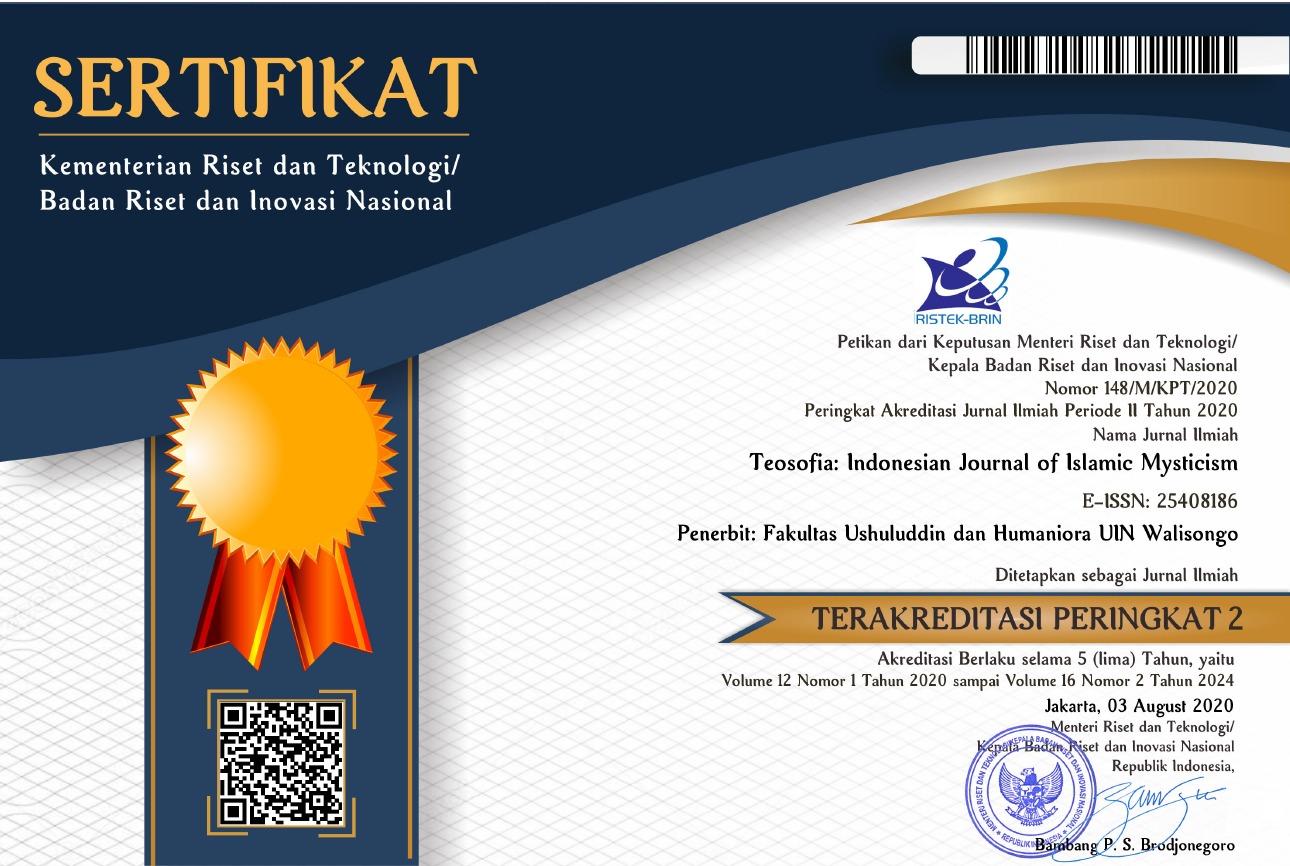Urban Sufism: The Dynamic of Cosmopolitan Religious Community
DOI:
https://doi.org/10.21580/tos.v11i2.14303Keywords:
urban sufism, religious reconstructionAbstract
The phenomenon of urban Sufism represents the new form of Sufism in the modern era. However, the diversity in urban society shows the dynamic of Sufism. This article is a qualitative study based on a library investigation that applies the Sufistic approach. Data collection was carried out by examining sources related to urban Sufism. This article found that internal and external factors influence the formation of religiosity in urban society. By nature, human beings need spirituality to seek their essence. In contrast, the external factors are discourses of modernisation and globalisation which are increasingly strengthened by some factors such as self-alienation, spiritual dryness, loss of humanism, hedonism, and materialism. The type of religiosity needed by modern urban society is universal, humane, social, logical, inclusive, and based on love and the principle of freedom.
Contribution: This study contributes to providing a new horizon of religious reconstruction, especially for urban communities that need a more open and inclusive model of religiosity.
Downloads
References
Abdullah, M. Amin. Multidisiplin, Interdisiplin dan Transdisiplin. Yogyakarta: IB Pustaka, 2021.
Abu Bakar, Usman. Paradigma dan Epistemologi Pendidikan Islam. ttp. UAB Media, 2013.
Ahmad Syafii Mufid, Kuasa Jibril dari Sufi Salamullah Hingga Spiritualisme Eden, dalam Martin Van Bruinessen Dan Julia Day Howelll. Urban Sufism. Jakarta: Rajawali Pers, 2008.
Amin, Samsul Munir. Ilmu Tasawuf. Jakarta: Amzah, 2015.
Anshori, M. Afif. Peran Tasawuf Perkotaan (Urban Sufism) Dalam Mengatasi Problema Psikologis (Studi Kasus pada Kaum Eksekutif di Bandarlampung). Lampung: LP2M IAIN Raden Intan Lampung, 2015.
Bagir, Haidar. Mengenal Tasawuf. Jakarta: Mizan, 2020.
Bin Makhilla, Dawud. ‘Uyun Al-Haqaiq. Terj. M. Ali. Tangerang Selatan: Alifia Books, 2022.
Chernysheva, EV. ‘Apperception Of Sufism: Sociocultural Background (Evidence From The Crimean Ulus Of The Golden Horde),’ Linguistics and Culture Review, 5(S2), Https://Doi.Org/10.37028/Lingcure.V5ns2.1362
Frager, Robert. Psikologi Sufi. Terj. Hasymiah Rauf. Jakarta: Zaman, 2014.
Gani. ‘Urgency Education Morals of Sufism in Millennial Era”, Journal for the Education of Gifted Young Scientists, 7(3), 27 August 2019), Https://Doi.Org/10.17478/ Jegys. 603574
Hamka. Perkembangan dan Pemurnian Tasawuf Dari Masa Nabi Muhammad Hingga Sufi-Sufi Besar. Jakarta: Republika, 2021.
Helwa, A. Secrets Of Divine Love. Terj. Marlina dan Arif. Jakarta: Kompas Gramedia, 2022.
Hermansyah, ‘Neo Sufisme Sejarah dan Prospeknya,’ Journal of Islamic Studies 3, no. 2 (September 2013). https://garuda.kemdikbud.go.id/journal/view/14028?issue=Vol%203,%20No%202%20(2013)
Hidayat, Komaruddin. Menelaah Urban Sufism - Urban Sufism Class. Https://Www.Youtube.Com/Watch? v= V94il W8y 7fI.
Huda, Sochi. ‘Historical Characteristics of Sufism in Classical, Modern and Contemporary Periods,’ Theosophy: Journal of Sufism and Islamic Thought 7, no. 1 (June 2017). Https://Garuda.Kemdikbud.Go.Id/documents/ detail / 1455377
Julia Day Howell. Sufism And The ‘Modern’ In Islam. London: I.B.Tauris, 2007.
Khan, Ayesha. Sophisticated Exploring Post-Tariqa Sufi Expression Amongst Young British Muslims, PhD. Religious And Theological Studies School Of History, Archeology And Religion Cardiff University, 2020.
Lata, Madhu. ‘Workplace spirituality and employee incivility: Exploring the role of ethical climate and narcissism,’ International Journal of Hospitality Management 102 (April 2022). https://Doi.Org/10.1016/J.Ijhm. 2022.103 178
Lone, Niyaz Ahmad. ‘The Role and Significance of Taṣawwuf in Modern-Day Crisis.’ Teosofia: Indonesian Journal of Islamic Mysticism 11, no. 1 (2022). https://DOI: 10.21580/tos.v11i1.12030
Madjid, Nurcholish. Islam Kemodernan dan Keindonesiaan. Bandung: Mizan Pustaka, 2021.
Mayseless, Ofra. ‘Preparing Youth For Participatory Civil Society: A Call For Spiritual, Communal, And Pluralistic Humanism In Education With A Focus On Community Of Philosophical Inquiry.’ International Journal of Educational Research 115, no. 102015 (2022). https://Doi.Org/10.1016/J.Ijer.2022.102015
Mutholingah, Siti. ‘Metode Penyucian Jiwa (Tazkiyah Al-Nafs) dan Implikasinya Bagi Pendidikan Agama Islam.’ Ta’limuna 10, no. 1 (Maret 2021). http://dx.doi.org/10.32478/talimuna.v10i1.662
Muvid, Basyrul. Tasawuf Kontemporer. Jakarta: Amzah, 2020.
Nurdinah, Muhammad. ‘Resistensi Masyarakat Urban dan Masyarakat Tradisional Dalam Menyikapi Perubahan Sosial.’ Jurnal Substantia 19, no. 2 (Oktober 2017). http://Dx.Doi.Org/10.22373/Substantia.V19i2.2882
Ranjabar, Jacobus. Perubahan Sosial. Bandung: Alfabeta, 2017.
Rubaidi. ‘Reorientasi Ideologi Urban Sufism.’ Teosofi: Jurnal Tasawuf dan Pemikiran Islam 5, no. 2 (2015), https://Doi.Org/10.15642/Teosofi.2015.5.2.
Siregar, Rivay. Tasawuf dari Sufisme Klasik ke Neo-Sufism. Jakarta: Raja Grafindo Persada, 2002.
Subair, Nurlina. Dinamika Sosial Masyarakat Urban. Makassar: Yayasan Inteligensia Indonesia, 2019.
Syukur, Amin. Tasawuf Sosial. Yogyakarta: Pustaka Pelajar, 2021.
Umar, Nasaruddin. Tasawuf Modrn. Jakarta: Republika, 2014.
Webner, Pnina. Hubungan Intim Di Dunia Modern, dalam Martin Van Bruinessen Dan Julia Day Howelll. Urban Sufism. Jakarta: Rajawali Pers, 2008.
Wen-Shing Tseng, Religion, Psychopathology, and Therapy, ( Handbook of Cultural Psychiatry, 2001.
Zohar, Danah dan Ian Marzhall. SQ Memanfaatkan Kecerdasan Spiritual dalam Berpikir Integralistik dan Holistik Untuk Memaknai Kehidupan. Terj. Rahmani Astuti, dkk. Bandung: Mizan, 2001.
Published
How to Cite
Issue
Section
License
Copyright
The copyright of the received article shall be assigned to the journal as the publisher of the journal. The intended copyright includes the right to publish the article in various forms (including reprints). The journal maintains the publishing rights to the published articles. Therefore, the author must submit a statement of the Copyright Transfer Agreement.*)
Licensing

This work is licensed under a Creative Commons Attribution-ShareAlike 4.0 International License.
In line with the license, authors are allowed to share and adapt the material. In addition, the material must be given appropriate credit, provided with a link to the license, and indicated if changes were made. If authors remix, transform or build upon the material, authors must distribute their contributions under the same license as the original.
_______
*) Authors whose articles are accepted for publication will receive confirmation via email and send a Copyright Transfer Agreement.








